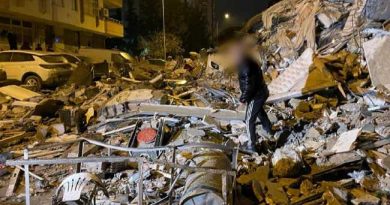Turkish PM Slams Rich Countries for Lack of Interest in Problems of Poor Countries
Turkish and other world leaders participating at a high-level U.N. conference in Istanbul slammed developed nations Monday for their indifference to – and responsibility for – the conditions of the world’s least developed countries.
“This conference aims to establish a vision on how the world will struggle against poverty and hunger. But I am sorry to say that the developed, rich countries have not shown satisfactory interest in this important conference,” Turkish Prime Minister Recep Tayyip Erdoğan said in a speech at the 4th U.N. Conference on the Least Developed Countries, or LDC-IV.
“There are problems that have no borders today, including environmental issues, climate change, poverty, terror and migration, which threaten not only certain countries or regions, but the whole world,” Erdoğan said.
He added that those who were ignoring or neglecting such global concerns were being seriously unfair to both their countries’ peoples and to all people in the world.
The world’s wealthy nations must empathize with those in poverty, Erdoğan said, adding that the problems of those who have no expectations or hope for their future are not only their own, but a concern for all of humanity.
Iranian President Mahmoud Ahmadinejad also said in his speech Monday that developed former colonialist countries share responsibility for the underdevelopment of the world’s least developed countries, or LDCs.
“For 400 years, most countries in Africa, Latin America and Asia have been left under the domination of slave traders and colonialists. Wealth and natural resources have been taken from these countries and people [have been left] in pain,” Ahmadinejad said. He added that the LDCs had thus been denied the right to develop by an unfair and imbalanced international economic system
“The one-sided and inequitable [system] among countries must undergo changes,” Ahmadinejad said. “A map must be drawn of the wealth and natural resources of LDCs, to be circulated among leaders of these countries,” which he said have the capabilities and resources needed to manage such wealth themselves.
An independent group should be created to calculate damages by colonialist countries, the Iranian leader said, also urging countries to lower their military expenditures and invest more in LDCs. “At least 10 percent of the military expenditures of the world’s 40 countries that exceed $1,200 billion must be allocated for LDCs.”
Twelve heads of states and 12 prime ministers participated in the opening ceremony of the conference, which is being held until May 13. These figures are expected to increase to 22 and 19 respectively, in the coming days of the conference, according to diplomatic sources. Some 44 ministers, 47 international organization leaders and more than 1,000 business enterprises will participate in the LDC-IV, which is being hosted for the first time by a developing country.
‘First heartbeats of a fair world order’
If the conference succeeds in bettering the lot of least developed countries, Istanbul will be remembered as the place where the first heartbeats of a new and fair world order were heard, according to Turkish President Abdullah Gül.
“Nothing would make us more proud [than] if, through the success of this summit and the following process, Istanbul is remembered as the place where the misfortune of almost a billion people has taken a positive turn,” Gül said Monday in his speech at the opening ceremony of the LDC-IV.
“Istanbul will then be the place where the first heartbeats of a new and fair world order are heard,” the president added.
An Istanbul Program of Action will be approved at the end of the conference. The establishment of monitoring mechanisms on the implementation of such a plan would be crucial to the success of the conference itself, said Gül, who suggested a Mid-Term Review Conference be hosted in Istanbul in 2015 to assess progress on carrying out the action plan.
Noting that LDCs account for nearly 13 percent of the world population, but receive only 1 percent of the global economic output, Gül added that the gap between rich and poor countries had been increasing. “This is an alarming situation. Not only in moral terms, but politically as well,” he said.
According to the United Nations, there are 48 least developed countries in the world today, compared to 25 in 1971. Only three countries so designated have managed to graduate from such a status over the past three decades: Botswana, Cape Verde and Maldives.
LDCs pose investment opportunities
“It is time to change our mindset,” U.N. Secretary-General Ban Ki-moon said in his speech at the opening ceremony, adding that assistance to LDCs had to be considered as an opportunity rather than charity.
“Investing in these countries is an opportunity for all. First, it is an opportunity to release the LDCs from poverty, hunger and diseases, which is our moral obligation,” he said. “Second, investing in LDCs can provide the stimulus that can help propel and sustain global economic recovery.”
Ban also stressed the importance of continuing trade and cooperation among LDCs and with developing countries as well, saying that South-South cooperation was one of the pillars of such an effort.
Nepalese Prime Minister Jhalnath Khanal also gave a speech at the conference, in which he said increased food prices had mostly affected the world’s poorest countries and that the impact of climate change had also affected LDCs negatively. Khanal called for all countries to take real action in addressing such major global challenges.
SOURCE: Hürriyet Daily News
May 9, 2011





